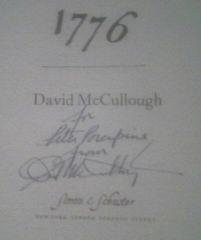Let Us Now Praise Famous Men

The fame which is based on wealth or beauty is a frail and fleeting thing; but virtue shines for ages with undiminished lustre.
Gaius Sallustius Crispus (c. 86–35/34 B.C.), Roman historian
Today is the 255th birthday of General Henry Knox. Before you say, 'who's he', consider that he is the person the Fort Knox is named after, that repository of incorruptible metal.
They brought a cake to the cemetary and sang patriotic songs, and as a part of the celebration, author David McCullough autographed copies of his most recent book, '1776', in which Gen. Knox figures greatly, at the General's home, Montpelier, as a benefit for the museum there. Again, why would such a prestigious author autograph books for a 'who's he?' figure in American history.
Gen. Henry Knox was a 25 year old bookseller in Boston at the outbreak of the Revolution. He had read military history avidly, but had never heard a shot fired in earnest in his life. Still, he joined the Continental Army as a Colonel, and became one of the two figures that George Washington could genuinely rely on during the war.
It was his idea to go to Fort Ticonderoga and drag the cannon there to Boston to provide a battery on Dorchester Heights to end Washington's seige of Boston. It is remarkable that a young officer could gain access to the chief commander, and even more remarkable that he was told to go ahead. It took him three months - across Lake George, on sledges through the snow, but he and his small troop walked and dragged sixty cannons, weighing a total of about 120,000 pounds over 300 miles, enabling Washington to shell the British and drive them out of Boston (and it was good of him to choose St. Patrick's day to do so, creating the Evacuation Day holiday for generations of state workers). Later in the war, he was invaluable during the battle of Trenton, getting the men into the boats and cajoling them to fight. Washington said that without his strong lungs, the crossing of the Delaware could never have succeeded.
Later in the day, McCullough gave a speech, decrying the lack of American History eductaion in our schools, warning that a generation of children were in danger of losing their own birthright.
When the Porcupine presented his book to be autographed, Mr. McCullough looked up and said, "So you're Peter Porcupine". "I am, sir", I replied in my most affable manner, clasping the hand he offered. He signed the book with a personal dedication to me, and I have read it and declare it to be a classic of its genre, underlining what the Porcupine wrote on Independence Day, that the War of Revolution was far from a sure thing, and men like Henry Knox, sea-green incorruptible, were the only reason it succeeded.
Fort Knox is well named after the man.







1 Comments:
What a facinating conversation in the line at the Knox home. Great to meet Peter in person!
Post a Comment
<< Home